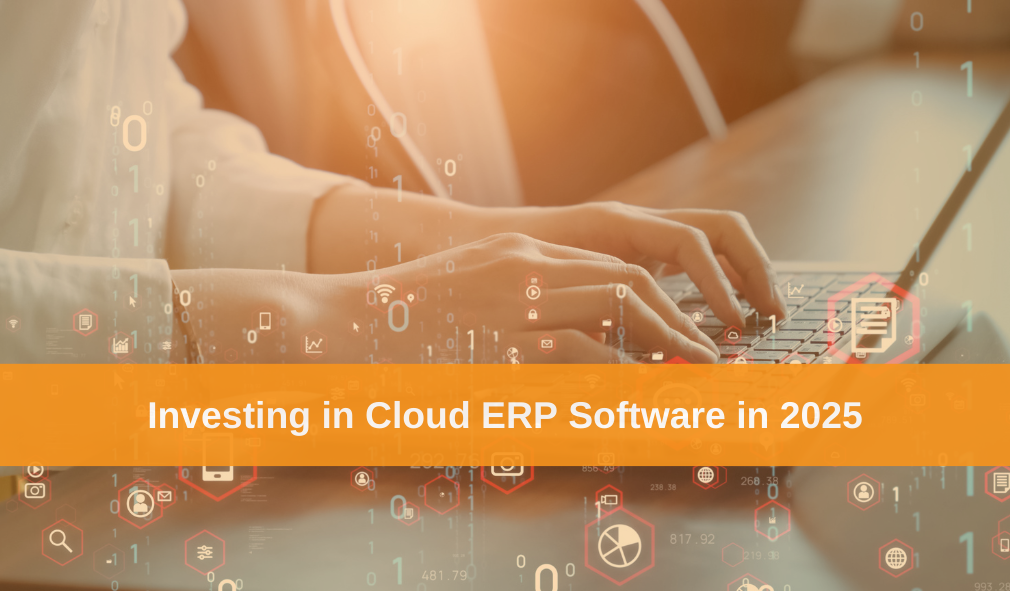2025 is fast approaching, and for many businesses, now is the perfect time to start to consider how to drive efficiency, scalability, and profitability in the new year.
As the year wraps up organisations find themselves reflecting on the past year while setting ambitious goals for the future. For forward-thinking organisations, now is the opportunity to align strategies, review operations, and implement tools that can propel growth and profitability.
Businesses experiencing growth often encounter a range of challenges that signal the need to invest in cloud a Enterprise Resource Planning (ERP) solution.
Cloud ERP software has solidified its position as a transformative investment for organisations aiming to streamline their processes and future-proof their operations.
Here’s why investing in cloud ERP software in 2025 is a game-changer for businesses looking to drive growth:
1. Enhanced Scalability and Flexibility
As businesses grow and evolve, they need software that can adapt quickly. Cloud ERP systems are designed with scalability in mind, allowing businesses to expand operations, add users, or integrate new features without significant disruptions.
Whether you’re opening new warehouses, entering new markets, or expanding product lines, cloud ERP software can grow alongside your business without the need for costly upgrades or infrastructure changes.
2. Streamline Operations Across Departments
As businesses expand, operational complexity increases. Teams may struggle with disconnected systems, duplicate data entry, and inefficient workflows, leading to delays and errors.
Cloud ERP software integrates core business functions—finance, inventory, HR, sales, and more into a single, unified platform. This ensures seamless communication between departments, eliminates redundancies, and keeps processes running smoothly, even as the business scales.

3. Real-Time Insights for Smarter Decisions
Growth requires agility, and businesses must make data-driven decisions quickly. Relying on outdated or fragmented systems often means working with incomplete or delayed information.
Cloud ERP software provides real-time access to data, enabling managers and decision-makers to monitor performance, identify trends, and respond proactively. Advanced reporting and analytics tools deliver actionable insights, helping businesses stay ahead of the curve.
4. Cost-Efficiency and Predictable Expenses
Traditional on-premises ERP solutions often come with high upfront costs for hardware, licenses, and IT maintenance. Cloud ERP software, on the other hand, operates on a subscription model, eliminating the need for expensive infrastructure.
Cloud ERP software operates on a subscription-based model, offering predictable monthly costs and reducing the need for expensive infrastructure. Vendors manage updates and maintenance, freeing up resources for other strategic initiatives.
5. Robust Security and Compliance
With growth comes increased data volume and regulatory requirements. Ensuring data security and compliance with industry standards can be challenging without the right tools.
Leading cloud ERP providers offer enterprise-grade security features, including encryption, multi-factor authentication, and regular updates. These systems are also designed to comply with global regulations, providing peace of mind as your business expands.
6. Improved Accessibility and Collaboration
The rise of remote and hybrid work environments has made cloud ERP software an essential tool for seamless collaboration. Employees can access the system from anywhere with an internet connection, ensuring productivity isn’t tied to a physical office.
Cloud ERP software also enables cross-departmental collaboration, breaking down silos and fostering better communication across teams.

7. Enhanced Customer Experiences
Meeting customer expectations is critical for growing businesses. Delayed orders, stockouts, or inconsistent service can damage your reputation and stall growth.
With real-time visibility into inventory, sales, and customer interactions, cloud ERP software ensures that your team has the tools to deliver exceptional service. Automated processes streamline order fulfillment, while accurate data helps personalise customer experiences.
8. Staying Competitive in 2025 and Beyond
With digital transformation accelerating across industries, businesses that fail to adopt modern technologies risk falling behind. A cloud ERP system equips your business with the tools needed to compete in a dynamic market, including automation, streamlined processes, and the ability to quickly adapt to industry trends.
A Strategic Investment for the Future
Investing in cloud ERP software in 2025 isn’t just about keeping up, it’s about positioning your business for long-term success. From cost savings and operational efficiency to advanced analytics and security, the benefits of cloud ERP far outweigh the initial investment.
If you’re considering a move to the cloud, now is the perfect time to explore your options. Partner with a trusted ERP provider to assess your needs and implement a solution tailored to your business.
By embracing cloud ERP, you’re not just investing in software, you’re investing in the future of your business.
About Momentum
Momentum Software Solutions are a fully accredited, multi-award-winning cloud based ERP and Payroll implementation consultancy. Momentum provide cloud-based, tailored business management solutions to bigger businesses throughout Australia. With our expert consulting team expanding across Queensland, New South Wales, Victoria and South Australia, Momentum have been empowering people in business and helping them think bigger for over 15 years.
Outgrown your current software and interested in cloud ERP software? Get in touch with our team of ERP experts on (07) 5479 1877 or fill out our form here for a no-obligation chat.
